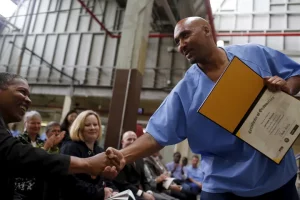Introduction:
Imagine yourself walking through a library door, shelves brimming with knowledge waiting to be explored US Prisoner Colleges Community. Now imagine this library existing within prison walls, offering not just escape through stories. But a tangible escape route towards a brighter future.
This is the reality for thousands of incarcerated individuals across. The United States thanks to an exciting wave of advancements in prison education initiatives. These programs are not just about acquiring information. They’re about breaking down barriers, unlocking potential, and building bridges to a life beyond the confines of incarceration.
Author
Enter the world of Dr. Sarah Reynolds, a passionate advocate for educational reform within the US prison system. With a background in social work and years of experience working directly with incarcerated individuals. Dr. Reynolds brings a unique perspective to the table. In this illuminating article. Dr. Reynolds delves into the profound impact of US Prisoner Colleges Community on rehabilitation in 2024. And shedding light on the transformative journeys of individuals seeking redemption through education.
1. The Urgency of Prisoner Rehabilitation

- Unravel the complexities of prisoner rehabilitation and the pressing need for holistic evidence.On based approaches to address the root causes of criminal behavior.
- Explore the far-reaching consequences of recidivism on individuals, families, and communities. And highlighting the cyclical nature of incarceration and the barriers to successful reintegration.
2. The Role of US Prisoner Colleges Community in Rehabilitation
- Examine the pivotal role of US Prisoner Colleges Community as engines of social mobility. And opportunity offering a wide range of educational programs and resources to incarcerated individuals.
- Discuss the unique advantages of US Prisoner Colleges Community-based education initiatives in promoting skill development, personal growth, and self-empowerment among prisoners.
3. Transformative US Prisoner Colleges Community Programs
- Showcase innovative community college programs tailored specifically for incarcerated populations, including certificate programs, associate degree pathways, and vocational training opportunities.
- Highlight success stories and testimonials from former inmates who have benefitted from US Prisoner Colleges Community behind bars, illustrating the transformative impact on their lives and prospects for the future.
4. Overcoming Challenges for US Prisoner Colleges Community

- Identify and address the systemic challenges and barriers facing US Prisoner Colleges Community programs for prisoners, such as limited funding, bureaucratic hurdles, and societal stigma.
- Explore strategies for building partnerships between US Prisoner Colleges Community, correctional institutions, and community organizations to enhance program accessibility, sustainability, and effectiveness.
5. Impact Assessment and Evaluation
- Evaluate the effectiveness of community college-based education initiatives in reducing recidivism rates, promoting successful reentry, and fostering positive societal outcomes.
- Examine evidence-based metrics and evaluation frameworks used to assess program impact, including student retention rates, academic achievement, post-release employment outcomes, and recidivism data.
6. The Ripple Effect: Building Stronger Communities
- Discuss the broader societal impact of community college education on prisoner rehabilitation, including its potential to break intergenerational cycles of incarceration and poverty.
- Explore the transformative power of education in empowering individuals to become agents of positive change within their families, communities, and beyond.
7. Looking Ahead: Future Directions and Opportunities
- Anticipate emerging trends and opportunities in the realm of community college-based education for prisoners, including advancements in online learning technologies, workforce development initiatives, and policy reforms.
- Advocate for continued investment and support for community college programs serving incarcerated populations, recognizing their vital role in promoting social justice, equity, and redemption.
Conclusion:
Education within the walls is not a privilege; it’s a powerful tool for personal transformation and societal progress. The innovative US prison education programs highlighted here offer incarcerated individuals a unique chance to bridge the gap to freedom, equipped with knowledge, skills, and the confidence to build a fulfilling future. If you’re ready to embark on this transformative journey, explore the programs mentioned and discover the path to your potential. Remember, knowledge is power, and it can unlock a world of possibilities beyond the walls.
By investing in educational opportunities for incarcerated individuals, we not only unlock their potential for personal growth and success but also strengthen the fabric of our communities and society as a whole. As we navigate the landscape of prisoner rehabilitation in 2023-2024 and beyond, let us stand united in our commitment to breaking chains, building bridges, and fostering pathways to redemption for all.










